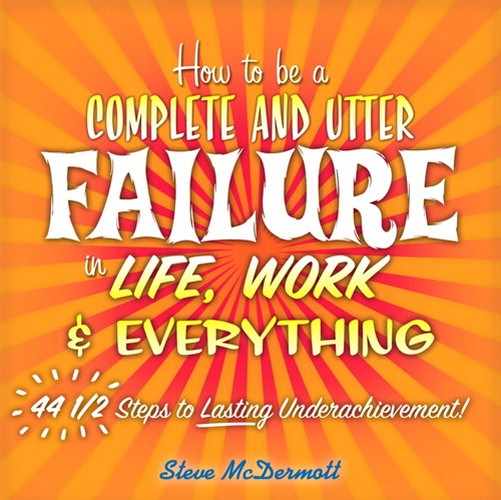It’s said that there are three types of people:
Those who make it happen
Those who watch what happens
Those who say, “What happened?”
Naturally, if your goal is developing lasting underachievement, then you want to ensure you belong to the third group. In order to do that, you must believe that where you find yourself today has little, if anything, to do with you. Everything—and I do mean everything, from what you do, how much you earn and who you are with—is a direct result of all the decisions you’ve made in your life, right up until this moment in time. And remember, a decision to do nothing is still a decision. You must continue to sit back, make yourself totally unaccountable and irresponsible, and wait for someone else to show up, on possibly a white charger, to bail you out and make things better. Mark Twain would encourage you not to do that by pointing out: “Don’t go around saying the world owes you a living; the world owes you nothing; it was here first.” But just put your hands over your ears until he goes away.
Some people argue that the key difference between humans and the rest of the animal kingdom is our conscious awareness. It’s claimed we are the only species, apart from perhaps the odd dolphin, that has the freedom to choose our reaction to any given set of stimuli. We can just react or we can think before we react. The idea is that it’s not what happens but how you respond to what happens that counts. You see, you might be pleased to hear that terrible things happen to successful people too. They just have a different response than you.
So just how response-able are you? If you are like the average person, you probably look for someone else or something else to blame. By the way, if you want an excuse for tolerating the blame culture that has grown up around us, you could blame it on the car insurance industry. Because what are you taught to do if you have an accident in your car? That’s right. It’s drilled into you: under no circumstances whatsoever admit liability. That’s why accident insurance forms have included genuine comments like: “As I approached the intersection, a stop sign appeared in a place where no stop sign had ever appeared before. I was unable to stop in time to avoid the accident.” or “An invisible car came out of nowhere, struck my vehicle, and vanished.”
Now I’m not saying if you have an accident you should leap out of your car and cry, “It was all my fault,” because it would probably affect your insurance, but I am saying successful people don’t let this way of thinking permeate all the other areas of their life. One of the best bosses I ever worked for always took full responsibility for the results the team generated and never looked for excuses (even when we, the people who worked for him, knew there were plenty available).
So don’t take ownership of your life, your feelings, and the results you produce. Don’t make your life all about getting results. Instead, use a favorite of failures the world over—the “wish” strategy. This is where you tell people you wish you could do something, for example: “I wish I could drive.” This will fool people that, one day, you are actually going to take some personal responsibility and do something about it. Whereas you have no intention of ever trying. Or for the sake of variety, how about indulging in a burst of “If only . . .” This is also a great expression for avoiding responsibility. For example, “If only I’d had a better education . . . If only I had more money . . . If only my Dad wasn’t an alcoholic . . . If only I didn’t live here . . . If only I were younger . . . If only I were older . . . then I’d be much more successful.” (Need I go on? I’m sure you can think of loads of your own favorite excuses.) Don’t, whatever you do, start to count how many times you wheel out these tired old excuses as a matter of habit, without even realizing that what you are truly expressing is just a series of limiting beliefs. Don’t think that instead of wasting all that energy moaning you could be getting off your fat backside and doing something about it. Talk to any successful person, and he’ll say in life there are only results or excuses. Which do you go actively looking for? You’ll find some other choice excuses, posing as rational reasoning, to add to your repertoire in Step Twenty-six.
Do you feel you are a trapped victim of circumstance or a free creator of circumstance? At the end of every Jerry Springer Show, Jerry points out: “No matter what your age, you are responsible for your own actions, irrespective of the actions or inactions of someone else. Past the age of legal reason, you and only you are accountable for what you do or don’t do.” Yet if you look at the guests on the show, and the people in Jerry’s audience, you’ll see that being responsible for your actions and accountable for all your results is too hard a belief for most people to follow. It’s much easier, for the vast majority, to blame things like circumstances, rather than themselves, for the fact that they’ve stood still for years or that things haven’t changed for the better.
So would you feel at home on the Springer show? You certainly don’t want to go on Oprah, who points out: “My philosophy is that not only are you responsible for your life, but doing the best at this moment puts you in the best place for the next moment.”
